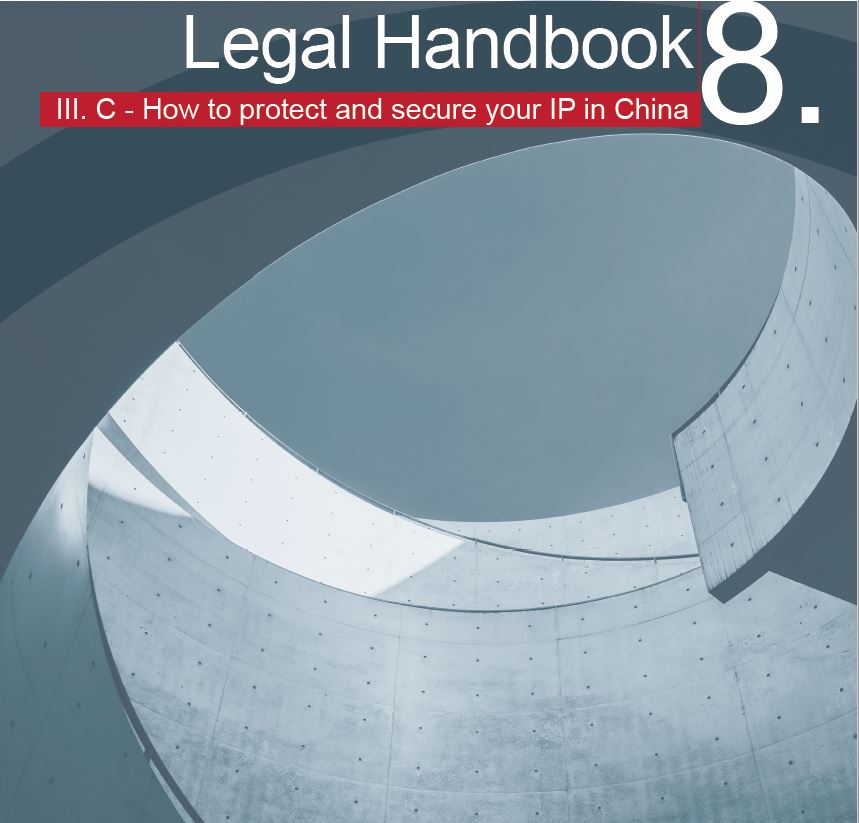Every company contemplating doing business in China shall look at its trademark protection before starting any steps.
The figures recorded by the Chinese Trademark Office (CTMO) clearly highlight that the Intellectual Property issues are taken seriously by foreigners and local players in China. By the end of the year 2013, the CTMO recorded 13.24 million trademark applications and 8.65 million registrations of which 7.24 million are still in force.
China is the country receiving the largest number of trademark applications not only because it is a key market but also because starting business in China without registering your trademark is extremely risky.
Why should you protect your trademark in China?
The CTMO operates on a “first in, first served” basis. This principle allows any third-party, Chinese or foreigners, to register in China any trademarks, including the trademarks that you have created.
Although you first create and use a trademark in China, you will not be entitled to get it back if a third-party has registered it. What really matters to the CTMO is the date of registration of the trademark.
What risks do you face by not registering your trademark in China?
Following the acceptation of the third-party’s registration, the rightful owner of “your” trademark is entitled to the exclusive right on that trademark and will prevent you from using it in China.
In practice, the following risks are as follows:
– Impossibility to sell and distribute in China
As you are the one violating China’s Trademark Law, the owner of “your” trademark may try to seize the products you want to sell in China.
To make sure you are the rightful owner of your trademark, a distributor may ask you to present the Chinese Trademark Certificates of the products you want to sell in China. Without this Trademark Certificate, you take the risk that the distributor refuses to sell your products or that it applies for your trademark registration in its name.
– Difficulties to manufacture in China
When your product is manufactured by a Chinese subcontractor in OEM, it may decide to register your trademark in China. At the end of the subcontracting relationships, any former subcontractor who has registered the trademark may try to prevent you from exporting the products manufactured by a new supplier.
As of to date, the rule of the law does not guarantee that the production to be exported can be released by the Chinese Customs authorities.
– ØDifficulties to open a shop:
The malls and shopping centers offering premium locations in China are reluctant to rent premises to tenant without proper right on the trademark of the shop. Providing the evidence of your rights on your Chinese trademark is frequently requested as a precondition for the opening of the shop.
– Distribution on the Internet
The biggest e-retailers such as Tmall, Jindong, mei.com or VIP shop will not work with anyone who cannot provide the evidence of its rights to use the distributed brands. However these platform of e-commerce cannot be missed if you want to develop business in China.
Which remedies can you use in China?
Despite the reinforcement in the China Trademark Law of the requirement that trademark applications shall be made in good faith, the CTMO still has a narrow conception of what constitutes bad faith. In practice, to require the cancellation of “your” trademark registration made by a third-party applicant, the basis of bad faith is difficult to prove to obtain the invalidation of the registration.
The legal remedies in China are inefficient and time consuming. The rate of success of an action for a trademark cancellation or forfeiture of trademark for non-use remains extremely low.
To deal with the registration of “your” trademark by a Chinese competitor, you may consider the following alternative options:
– Starting negotiations to buy back the trademark; or
– Adapting your trademark for the Chinese market by registering elements distinctive enough to increase the chances of success.
To avoid such a situation, we recommend you to register your trademark in China as soon as possible if you plan to deal with Chinese partners or have business related to China.
When to protect yourself?
It is vital to protect your trademark in China:
– Before any commercial prospection ;
– Prior to any contact with potential suppliers.
Trademarks are protected on a country-by-country basis. Besides, the registration in China is effective only within the territory of mainland China. Protection in China is not recognized in Hong Kong, Macao and Taiwan as these territories have their own authorities and request specific registrations.
Again proving that you are the owner a trademark may be a precondition to sign a deal with some distributors. You have to take into account that the registration of trademark is a long process. The procedure for registration of a trademark will take for 18 to 24 months (from the day where the file is accepted by the CTMO).
How to protect your trademark in China?
When registering a trademark in China, you shall prepare carefully the application as the CTMO has its own specificities.
For instance, in addition to the classes from the Nice classification, the CTMO uses subclasses. One subclass corresponds to one product or service. 10 products or services by protected class can be registered for each application.
You can include the brand and logo or brand in multiple languages (e.g. Chinese and Latin) in the same application for registration. If an application is rejected, the whole procedure can be repeated from the beginning.
The trademark is protected from the time when the application is registered by the CTMO. In case of contestation from a third party, the date of filing can be used as a proof of anteriority. The registration will be final in the absence of rejection by either the CTMO or an opposition by a third-party.
The trademark will be protected for renewable periods of 10 years.
If your trademark is not protected at the time of the signature of a contract with Chinese counterparts, proper wording must be included in the contract.
Why should you register in Chinese?
For commercial purpose, it is recommended to create and protect a trademark in Chinese language so that Chinese consumers can appropriate your brand in a language understandable to them.
As a product branded only with Chinese characters in a Western country would have very little chance to impact the consumers, selling in China a brand with Latin letters may not be relevant. Chinese consumers often find that a Chinese name of a foreign trade mark is much easier to pronounce and to remember. A Chinese version of a foreign mark can be a transliteration or a translation, or the company can develop a distinctive Chinese mark.
For more information, please contact Bruno Grangier.






